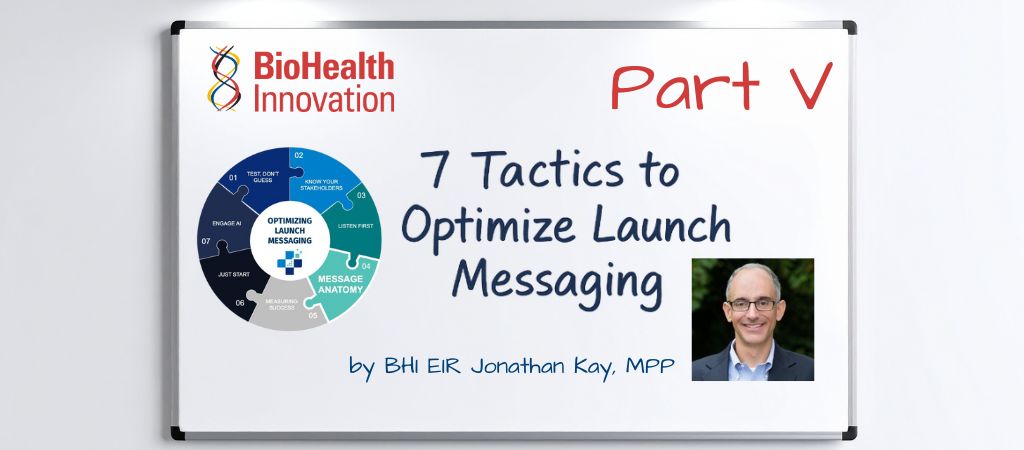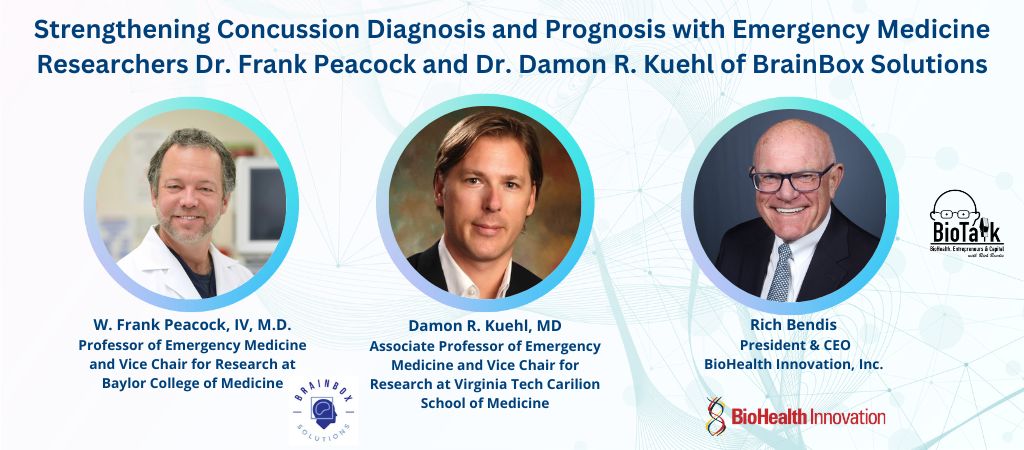
Dr. Frank Peacock and Dr. Damon R. Kuehl join BioTalk for a focused discussion on one of emergency medicine’s most persistent challenges: accurately diagnosing and predicting outcomes in mild traumatic brain injury. As Scientific Advisory Board members for BrainBox Solutions, Inc., they walk through what happens when a patient presents to the emergency department after a fall or sports injury and why current tools, including CT scans, often leave clinicians without clear answers. The conversation explores the gap between a “normal” scan and ongoing symptoms, and what missed or uncertain diagnoses can mean for patients weeks later.
Dr. Peacock outlines the HeadSMART II study and explains why combining blood biomarkers with neurocognitive testing provides a more complete assessment than biology alone. Dr. Kuehl discusses how multi-modal data, integrated through artificial intelligence, can generate an objective score to support real-time clinical decision-making and help identify patients at risk for persistent symptoms. The episode also highlights BrainBox’s leadership, including CEO Donna Edmonds, a member of the BioHealth Innovation Board of Directors, and the company’s role in advancing objective mTBI testing.
Listen now via your favorite podcast platform:
Apple: https://apple.co/4aiigz6
Spotify: https://bit.ly/4rZQWf7
iHeart: https://ihr.fm/3ZAGiPL
Amazon Podcasts: https://amzn.to/4bY0Fha
YouTube Music: https://bit.ly/4aF6SMB
TuneIn: https://bit.ly/4rXcx7V
Editing and post-production work for this episode was provided by The Podcast Consultant (https://thepodcastconsultant.com).
Dr. W. Frank Peacock IV is Professor of Emergency Medicine at Baylor College of Medicine. Chief Medical Officer at AseptiScope, and the founder of both a contract research organization called Comprehensive Research Associates, LLC and a medical education company named Emergencies in Medicine, LLC. Dr. Peacock received his medical degree from Wayne State University Medical School and completed his Emergency Medicine training at William Beaumont Hospital. He has >900 peer reviewed publications and is also the co-editor of multiple medical textbooks on heart failure, acute coronary syndromes, and traumatic brain injury.
Dr. Damon R. Kuehl is the Vice Chair of Research and Academic Affairs and Professor in the Department of Emergency Medicine at Virginia Tech, School of Medicine. He completed Medical School at University of Minnesota Medical School and his Emergency Medicine Residency at Stanford University. He has also completed residencies in Preventive Medicine and a Research Fellowship in the Center for Policy and Research in Emergency Medicine, at Oregon Health and Science University. Dr. Kuehl’s research primarily focuses on diagnostic and prognostic uncertainty in brain injury. He is a lead investigator for HeadSMART II and for HeadSMART Geriatrics, a NINDS funded 3 year study to develop a diagnostic tool for head trauma in older adults. He is the founder of the Carilion Brain Injury Center and also an investigator with the Virginia Tech Center for Biomechanics studying the boundary conditions associated with injuries in older adult falls.

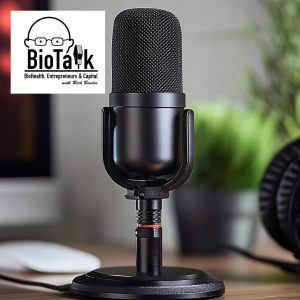 BioTalk with Rich Bendis wants to hear from its audience about the voices that deserve the mic. A new guest submission form is now live at https://bit.ly/BioTalkGuest, making it easy for listeners, partners, and community members to recommend leaders shaping the future of biohealth.
BioTalk with Rich Bendis wants to hear from its audience about the voices that deserve the mic. A new guest submission form is now live at https://bit.ly/BioTalkGuest, making it easy for listeners, partners, and community members to recommend leaders shaping the future of biohealth.
BioTalk is a long-running podcast hosted by Rich Bendis that focuses on the real stories behind innovation in the life sciences. The show features open, unscripted conversations with founders, executives, scientists, investors, policymakers, and ecosystem builders who are moving ideas from lab to market. Topics range from company building and commercialization to policy, workforce, capital, and collaboration. The goal is clarity and perspective, grounded in experience.
With nearly 200 episodes, BioTalk has built a strong following across the industry. Many conversations highlight leaders and initiatives connected to the BioHealth Capital Region, while others bring in national and global voices whose work influences the region and the broader biohealth landscape. Episodes are designed to be accessible and relevant, offering insights that listeners can actually use.
Now, BioTalk is turning to its audience. Who should be featured next. Which voices are missing. Who is doing work that more people should hear about. If you know a founder, researcher, investor, policymaker, or industry leader with a compelling story or perspective, submit a recommendation at https://bit.ly/BioTalkGuest. The podcast wants to reflect what its listeners care about and continue spotlighting the people driving the biohealth industry forward.
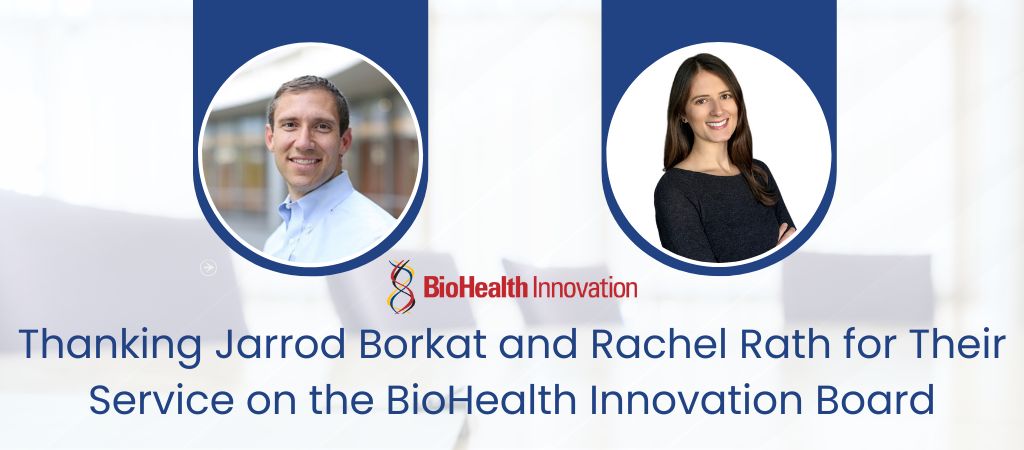
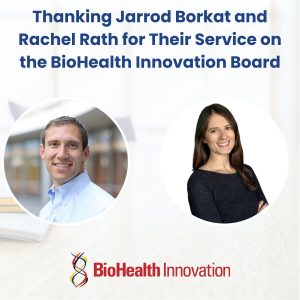 BioHealth Innovation extends its sincere thanks to Jarrod Borkat, Chief Commercial and Strategy Officer at On Demand Pharmaceuticals, and Rachel Rath, Head of JLABS @ Washington DC, for their dedicated service on the Board of Directors.
BioHealth Innovation extends its sincere thanks to Jarrod Borkat, Chief Commercial and Strategy Officer at On Demand Pharmaceuticals, and Rachel Rath, Head of JLABS @ Washington DC, for their dedicated service on the Board of Directors.
Throughout their tenure, both leaders brought a steady, thoughtful presence to the board and helped strengthen the organization’s role within the BioHealth Capital Region. Their perspectives, grounded in deep industry experience and regional engagement, supported informed decision-making and reinforced a shared commitment to advancing innovation across the ecosystem.
Jarrod Borkat’s career spans senior commercial, strategy, and partnership roles across the biopharmaceutical sector. His experience building large-scale collaborations among industry, academia, and government brought practical insight to board discussions, particularly around commercialization pathways and cross-sector engagement. His long-standing involvement in the region reflects a consistent belief in collaboration as a foundation for sustainable growth.
During his time with MedImmune and AstraZeneca, Jarrod played a key role in advancing the BioHealth Capital Region (BHCR) brand and strengthening its national profile. He was also a strong advocate for BioHealth Innovation expanding its footprint into Washington, DC, and Virginia, helping foster a more integrated regional ecosystem. In addition, he served on the Board’s Executive Committee, where his strategic perspective supported organizational growth and transition.
Rachel Rath provided a complementary lens shaped by her leadership at one of the region’s most active innovation platforms. Her work evaluating and accelerating early-stage companies, along with prior experience supporting national health security and clinical research initiatives, informed the board’s understanding of emerging technologies and the needs of founders navigating complex development environments.
“Jarrod and Rachel have been exceptional board members and trusted partners,” said Rich Bendis, Founder, President, and CEO of BioHealth Innovation. “Their leadership, insight, and commitment to the BioHealth Capital Region have made a lasting impact. We are grateful for their service and for the time and expertise they so generously shared.”
BioHealth Innovation wishes both leaders continued success and looks forward to their ongoing contributions to the region’s innovation community.

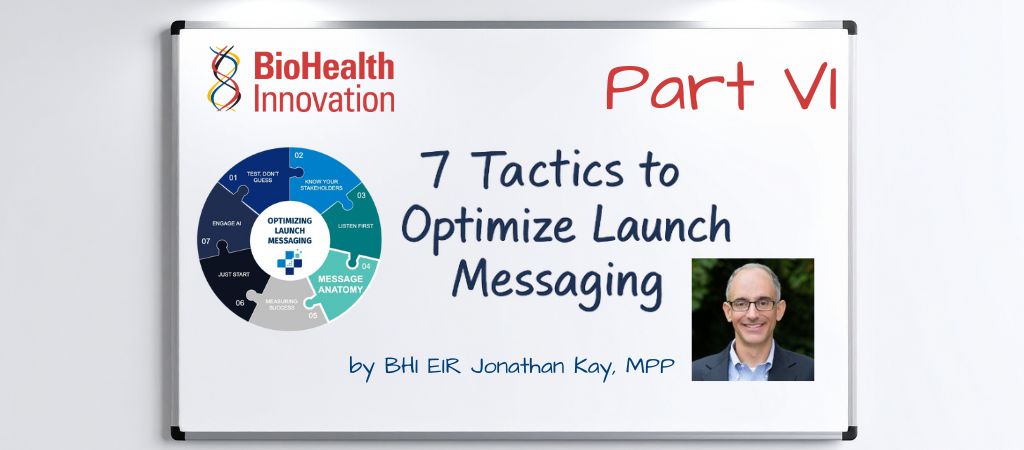
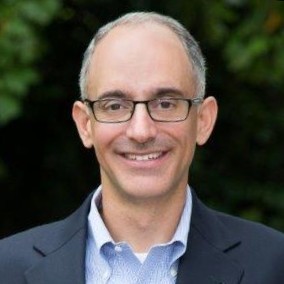 by
by 